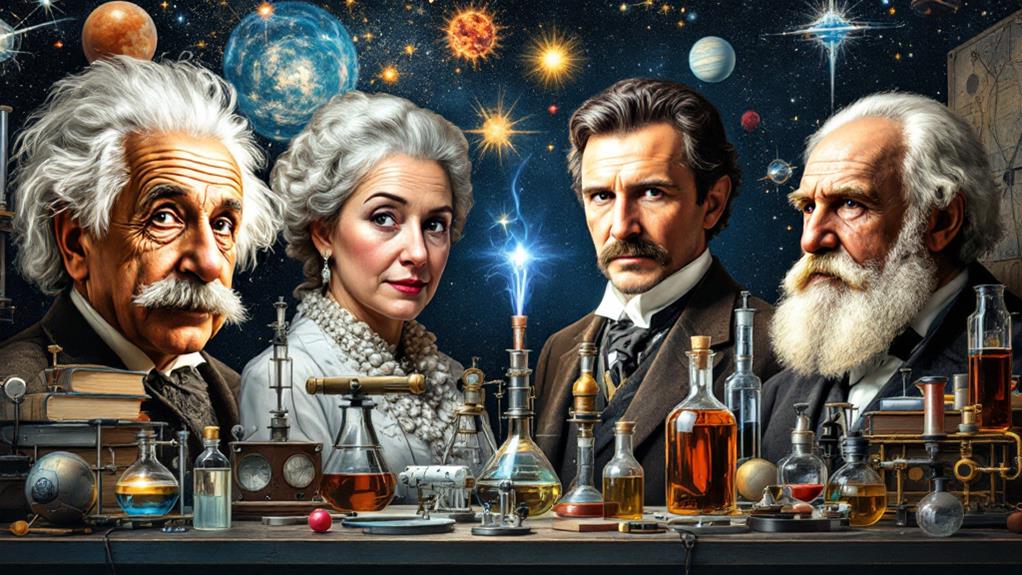Who Are the Famous Moral Skeptics?

If you're curious about famous moral skeptics who challenge traditional ethics, start with Pyrrho of Elis, the founder of Skepticism. He questions the certainty of moral knowledge. David Hume highlights emotions as the basis of moral judgments rather than reason. Friedrich Nietzsche boldly critiques societal moral values. A.J. Ayer and J.L. Mackie both argue against the existence of objective moral truths, with Ayer focusing on emotivism and Mackie on error theory. Richard Joyce and Gilbert Harman investigate moral error theory and relativism. Each thinker offers intriguing insights that encourage you to reconsider accepted moral frameworks.
Pyrrho of Elis
Pyrrho of Elis, widely regarded as the founder of Skepticism, challenges you to reconsider what you think you know about morality. Pyrrho's philosophy suggests that our understanding of right and wrong is not as clear-cut as it seems. Originating the Skepticism movement, Pyrrho proposed that we can't trust our perceptions or beliefs to provide certain knowledge. This radical approach lays the groundwork for ethical relativism, which posits that moral values are not universal but rather shaped by cultural or individual perspectives. In a way, cultural pressures to conform can also influence our moral beliefs, similar to how they lead suspects in Japan to confess even when innocent. Pyrrhonian arguments urge you to suspend judgment and accept uncertainty in ethical matters. By doing so, you can achieve a state of ataraxia, or tranquility, free from the anxiety of trying to discern absolute truths. The practical implications of Pyrrho's views are profound; they invite you to question ethical norms and consider multiple viewpoints before reaching resolutions. This approach has had a lasting influence on ethics, encouraging a more open-minded and flexible understanding of morality. By adopting Pyrrho's Skepticism, you can navigate ethical dilemmas with a greater sense of calm and adaptability, allowing for a more nuanced appreciation of diverse moral landscapes.
David Hume

David Hume, a towering figure in the domain of moral philosophy, invites you to revisit your assumptions about human nature and morality. Through Hume's empiricism, he challenges you to reflect that our moral judgments aren't derived from reason alone. Instead, they're rooted in your experiences and emotions. Hume argues that feelings of approval or disapproval guide our moral decisions, suggesting that emotions play a vital role in ethical considerations. It's akin to how gaslighters manipulate perception, leaving their victims questioning their reality based on emotional responses rather than facts. Humean ethics, consequently, revolves around the idea that morality is more about sentiment than cold, hard facts. Hume believes that when you experience a situation, your emotional responses shape your perception of right and wrong. This approach contrasts sharply with the rationalist perspective that reason is the sole driver of moral thought.
Friedrich Nietzsche

When exploring the domain of moral skepticism, Friedrich Nietzsche's philosophical insights can't be ignored. Known for challenging traditional perspectives, Nietzsche's nihilism plays a central role in his critique of moral values. He argues that moral values are not inherent truths but rather constructs imposed by society to maintain order and control. Nietzsche believes these values often stem from human weakness and fear, rather than genuine virtue or strength.
You're encouraged to examine how Nietzsche questions the basis of morality, suggesting that it lacks objective foundation. He famously declares that "God is dead," implying that the decline of religious authority leaves a void in moral guidance. Nietzsche's nihilism suggests that, without divine or universal truths, individuals must create their own values and purpose. This radical idea challenges you to rethink conventional moral frameworks and consider the possibility of self-determined ethics.
Nietzsche's work pushes you to confront the uncomfortable reality that moral values might be arbitrary, inviting you to accept the freedom and responsibility of crafting your own moral compass. By doing so, he inspires a profound shift from external validation to personal authenticity, urging you to live genuinely and courageously.
A.J. Ayer

While Nietzsche's provocative ideas unsettle established moral beliefs, A.J. Ayer presents a more analytical approach to ethics. You might find A.J. Ayer's ethics intriguing because he challenges the notion that moral statements can be true or false. Instead, he believes that moral language merely expresses emotions or commands. Ayer's emotivism suggests that when you say something is "wrong," you're not stating a fact but rather expressing disapproval or trying to influence someone's actions. This perspective stems from his adherence to logical positivism, which asserts that meaningful statements must be either empirically verifiable or analytically true.
Ayer's emotivism doesn't claim that moral judgments are meaningless but rather non-cognitive; they don't convey truth values. So, when you engage in moral discussions, according to Ayer, you're not arguing over objective truths but rather expressing subjective feelings. This radical view challenges you to reconsider how you perceive moral claims and disputes. A.J. Ayer's ethics impact how you might approach moral philosophy by emphasizing the emotional and persuasive elements of moral language, rather than any objective moral truths. Consequently, Ayer invites you to see moral statements as tools of influence rather than declarations of fact.
J.L. Mackie

J.L. Mackie was a prominent moral skeptic whose ideas might challenge your understanding of ethics. He's best known for Mackie's Error Theory, which argues that our moral judgments are fundamentally flawed. According to Mackie, when you claim something is morally right or wrong, you're assuming the existence of objective moral values. However, Mackie proposed that such values don't exist. This doesn't mean he thought moral discussions were meaningless; rather, he believed they were based on erroneous assumptions.
In exploring Mackie's Error Theory, you might notice parallels with Moral Relativism. While both question the objectivity of moral values, they're not identical. Moral Relativism suggests that moral truths are culturally or individually based, meaning your moral code might differ from someone else's due to cultural context. Mackie, however, went further, arguing that all moral statements fail to express objective truths, regardless of cultural or personal perspective.
Richard Joyce

In addition to J.L. Mackie, Richard Joyce is a crucial figure in the world of moral skepticism. When you investigate his work, you'll find he champions the concept of "moral error theory." This theory suggests that while we often make moral claims, these claims are fundamentally flawed because they attempt to assert objective truths that don't exist. Joyce argues that our moral discourse is riddled with errors because it falsely presumes the existence of objective moral facts.
Unlike ethical relativism, which suggests that moral truths vary based on cultural or individual perspectives, Joyce's moral error theory asserts that all moral claims are uniformly mistaken. He doesn't argue that some cultures get morality right while others don't; rather, he believes no culture truly gets it right because moral facts simply aren't there to begin with.
Delving into Joyce's arguments, you're encouraged to rethink the nature and basis of your moral beliefs. His work challenges you to reflect on whether your moral judgments hold any real weight if they're based on non-existent truths. By questioning these foundational beliefs, Joyce pushes the boundaries of traditional moral philosophy, inviting you to reconsider the essence of morality itself.
Gilbert Harman

Gilbert Harman stands out as a significant figure in the domain of moral skepticism, offering a distinctive approach that challenges traditional moral theories. You'll find his perspective fascinating, as he argues that moral relativism plays an essential role in understanding ethical judgments. Harman suggests that moral claims don't reflect objective truths but are instead shaped by cultural and individual perspectives. This view raises intriguing questions about the nature of morality and if universal moral principles truly exist.
In exploring moral relativism, Harman's work emphasizes the importance of context when evaluating ethical implications. You might consider how different societies develop unique moral codes and how these variations impact our understanding of right and wrong. Harman encourages you to think critically about if moral disagreements arise from differing perspectives rather than genuine moral errors.



